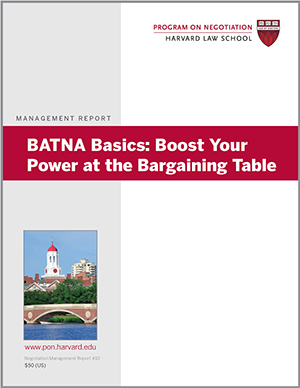
Experienced negotiators understand that they should reject any deal on the table that is inferior to their best alternative to a negotiated agreement, or BATNA. At an auto dealership, for example, you shouldn’t buy a used car if you are pretty sure you can get a better deal on a comparable car elsewhere. Yet in the heat of the moment, people often accept options that are inferior to their BATNA, professor Ece Tuncel of Webster University and her colleagues found in a study published in Psychological Science. Negotiation mistakes such as this can lead us to squander our resources. They can also trigger regret and disappointment months and even years down the line.
Documenting Negotiation Mistakes
In one of the experiments in the study, participants were told they were being paired online with a person whom they did not know and would not meet or deal with again. (In actuality, there was no such person.) Participants were asked to divide a fixed number of points between themselves and the other party nine times; each time, one party’s gain would be the other party’s loss.
For each of their nine choices, participants were asked to select between an option that gave them fewer points than their counterpart and an option that gave them more. In the “framed” condition, the former option (fewer points for themselves) was labeled “Agreement,” and the latter option (more points for themselves) was labeled “Impasse.” In the control condition, the former option was labeled “Option A,” and the latter option was labeled “Option B.”
The results showed that participants in the framed condition chose the Agreement option 24.55% of the time, while those in the control condition chose the equivalent Option A only 3.99% of the time. That is, participants’ bias toward reaching agreement (and/or not reaching impasse) often led them to make negotiation mistakes—choices that left them worse off than their counterpart. This was true despite the fact that they knew they would not be building a long-term relationship with the other party.
In another experiment, MBA students in a negotiation course bargained face-to-face, and their outcomes were linked to their grades in the course. Participants in this study also made negotiation mistakes: They often preferred to reach a deal that was economically suboptimal for them personally rather than reach an impasse. In about 75% of the pairs who reached agreement, one party settled for a deal that was detrimental to their economic interest in the negotiation and their course grade.
Agreement Attraction or Impasse Aversion?
The researchers noted that it’s worth looking at why participants made these apparently common negotiation mistakes. Did they agree to subpar deals because they felt psychologically compelled toward agreement or because they felt a strong desire to avoid impasse?
Consider that negative events (such as impasse) tend to affect us more strongly than positive events (such as agreement), a phenomenon that Roy F. Baumeister of Case Western Reserve University and his colleagues dubbed the “bad is stronger than good” effect in a 2001 paper. For example, if you suddenly lose $1,000, you are likely to have a stronger reaction than if you suddenly receive the same amount of money. Based on this effect, Tuncel and her colleagues theorized that for most negotiators, the motivation to avoid impasse—a negative event—is likely stronger than the motivation to seek agreement—a positive event.
Indeed, that is what the researchers found in another of their experiments. Specifically, when making monetary allocations between themselves and a partner, MBA students were more likely to choose the personally disadvantageous option when it allowed them to avoid impasse than when it allowed them to reach agreement. So-called impasse aversion was the main explanation for their negotiation mistakes.
Overcoming Negotiation Mistakes: Becoming Comfortable with Impasse
In our own negotiations, how can we overcome this predisposition toward impasse aversion, which can lead us to accept an agreement that’s worse than our BATNA?
Awareness of the tendency could help motivate us to make fewer negotiation mistakes by more thoroughly comparing the option on the table with our alternatives away from it. In addition, simply avoiding the words “impasse” and “agreement” entirely during our business negotiations may help avoid stirring up the strong motivations associated with these terms, the researchers suggest.
Working as a team can help us avoid several negotiation mistakes, including this one. Researcher Taya R. Cohen of Carnegie Mellon University and her colleagues found that teams of negotiators were more likely than individual negotiators to reach impasse when impasse was the rational choice. Therefore, to avoid impasse aversion, you might consider working as part of a team or enlisting advisers to help you evaluate your options in negotiation.
Do you think you have experienced impasse aversion in your negotiations? What advice do you have for avoiding such negotiation mistakes?





